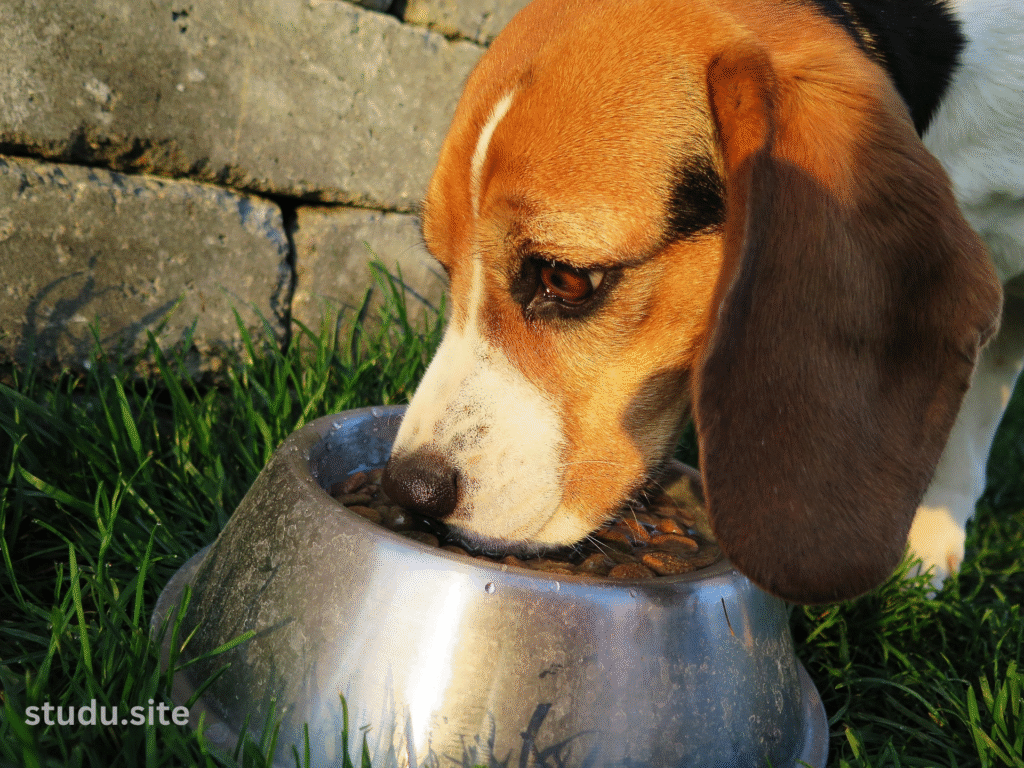Introduction
You’ve probably found yourself asking, “Can dogs eat pickles?” when your dog is looking at you with those sad puppy eyes as you snack on a dill pickle. Pickles are a favorite snack for people, but are they safe for your dog? While small amounts of plain pickles might not harm most dogs, their high sodium content and potential for toxic ingredients make caution essential. In this comprehensive 2025 guide, we’ll explore whether dogs can eat pickles, the risks and benefits, and how to safely incorporate them into your dog’s diet.

Can Dogs Eat Pickles?
The quick answer is that plain pickles may be fed to dogs in tiny quantities as an infrequent treat, but they are not a suggested or recommended component of a dog’s diet. Pickles—usually cucumbers pickled in vinegar or brine—are non-toxic to dogs at their most basic level. Nonetheless, their high salt content, possible spices, and additives can be harmful. Knowing what kind of pickles are safe and how to feed them properly is the key to maintaining your dog’s health.
Are Pickles Safe for Dogs?
Plain dill or kosher pickles, which contain few ingredients (cucumbers, water, vinegar, salt), are safe for dogs in small amounts. Not all pickles, however, are safe for dogs. This is a summary of what makes pickles safe or not safe:
Safe Pickles for Dogs
Plain Dill Pickles: These have cucumbers, water, vinegar, salt, and possibly dill. They’re usually safe in small quantities because cucumbers are not toxic and low-calorie.
Home-made Pickles: Home-made pickles free from added sugars, spices, and toxic ingredients are the best choice since you have complete control over sodium intake.
Low-Sodium Pickles: Low-sodium brands of pickles are available in stores, which are safer for dogs but still need to be administered in moderation.
When presenting pickles, keep them plain, rinse them well to minimize salt, and cut into small pieces to avoid choking.
Unsafe Pickles for Dogs
Some pickles have ingredients that are toxic or dangerous to dogs. Stay away from these:
Pickles with Onions or Garlic: Many pickles, particularly gourmet or spicy pickles, contain garlic or onions, which are poisonous to dogs and can destroy red blood cells and cause anemia.
Sweet Pickles: These may have added sugar or artificial sweeteners such as xylitol, which is extremely poisonous and can lead to life-threatening hypoglycemia.
Spicy Pickles: Chili pepper- or spicy seasoning-added pickles may irritate a dog’s digestive system and stomach.
Pickles with Additives: Some commercial pickles with additives like preservatives, artificial flavorings, or excessive vinegar can irritate a dog’s stomach.
Always read the ingredient label before offering your dog pickles, and steer clear of ones with suspect additives.
Potential Benefits of Pickles for Dogs
Though pickles are not a nutritional gem for dogs, they have some small advantages when eaten in moderation:
Hydration from Cucumbers: Pickles begin as cucumbers, which are 95% water content, granting a minor hydration source.
Low-Calorie Treat: Regular pickles are low in calories, so they can be a possible treat option for a dog on a weight control diet.
Probiotics (Fermented Pickles): Naturally fermented pickles (not vinegar-based) have probiotics which could help with gut health, though the sodium content in them generally trumps this as a benefit.
Antioxidants: Cucumbers themselves in pickles may have trace amounts of antioxidants and vitamins such as K and C, but these are negligible after being pickled.
In spite of these advantages, pickles can be nothing more than an occasional snack, since dogs derive vital nutrients from a balanced diet specifically made for their nutritional requirements.
Hazards of Feeding Pickles to Dogs
Feeding pickles to dogs poses a number of hazards that need to be weighed by pet owners:
1. Excessive Sodium Content
Pickles are infamous for their high sodium content because of the brining process. Too much sodium can cause:
- Salt Poisoning: Signs and symptoms include vomiting, diarrhea, lethargy, tremors, or seizures. Canine heart and kidney patients are particularly susceptible.
- Increased Thirst: High sodium levels may lead to excessive thirst and urination, putting a dog’s system under pressure.
2. Toxic Ingredients
As mentioned, garlic, onions, and xylitol in certain pickles are poisonous. They can trigger serious health problems even if taken in small quantities, necessitating prompt veterinary care.
3. Digestive Upset
The spices and vinegar found in pickles are likely to make a dog’s stomach upset and result in vomiting, diarrhea, or gas. Sensitive dogs are more susceptible.
4. Allergic Reactions
Some canines can be sensitive to ingredients used in pickles, including dill or vinegar. Symptoms of an allergy are itching, swelling, or gastrointestinal problems.
5. Choking Hazard
Whole pickles or big pieces can cause choking, particularly in small dogs. Always chop pickles into small, bite-sized pieces.
How Much Pickle Can Dogs Eat?
If you choose to offer pickles to your dog, moderation is essential. Pickles should not constitute more than 10% of your dog’s total caloric intake, and even less is preferable because of sodium content. Recommendations are:
- Small Dogs (10–20 lbs): A small slice (1 teaspoon) every week, rinsed to lower salt.
- Medium Dogs (20–50 lbs): A small slice (1–2 teaspoons) as an occasional treat.
- Large Dogs (50+ lbs): A single thin slice or two a week, well rinsed.
Always introduce pickles gradually and watch for negative reactions. Please talk to your veterinarian before feeding pickles, especially dogs with health issues such as kidney disease or heart conditions.
What to Do If Your Dog Eats Unsafe Pickles
If your dog eats pickles with hazardous ingredients (such as garlic, onions, xylitol) or a large quantity, take the following steps:
- Identify the Ingredients: Refer to the pickle’s label or recipe to check if it has poisonous ingredients.
- Contact Your Vet: Phone your veterinarian or emergency clinic immediately, with information about the pickle and amount consumed.
- Monitor Symptoms: Observe for signs of distress, including vomiting, depression, shaking, or trouble breathing, and inform your vet.
- Save Evidence: Save a sample of the pickle for your vet to be able to identify poisonous ingredients.
Prompt action can avert dangerous complications due to toxic contents or sodium toxicity.
Tips for Feeding Pickles to Dogs in a Safe Manner
To make pickles a safe treat for your pet, use the following guidelines:
- Use Plain Pickles: Pick dill or kosher pickles that have few ingredients and no garlic, onions, or sweeteners.
- Rinse Through: Rinse pickles under water to get rid of excess salt and vinegar.
- Offer Tiny Portion Sizes: Cut pickles into tiny pieces to avoid choking and restrict consumption.
- Avoid Feeding Often: Use pickles as an occasional treat, not a daily snack.
- Check Allergies: Introduce pickles slowly and monitor for signs of sensitivity, including itching or stomach upset.
- Consult Your Vet: Have veterinary clearance, particularly in dogs with health issues or dietary needs.
Alternatives to Pickles for Dogs
If you’re hesitant about feeding pickles, consider these dog-safe alternatives that offer similar crunch and hydration:
- Fresh Cucumbers: Plain, raw cucumbers are low in calories, hydrating, and safe for most dogs.
- Carrots: These provide crunch, fiber, and vitamins without the sodium or vinegar.
- Green Beans: Low-calorie and nutritious, green beans are a great treat for dogs.
- Apples (No Seeds): Sliced apples offer a sweet, crunchy alternative, but remove seeds and core.
Always introduce new foods slowly and seek advice from your vet for customized guidance.
FAQs Regarding Dogs and Pickles
1. Can dogs have pickles daily?
No, pickles should be an occasional treat owing to excessive sodium and risk of gastrointestinal upset. Daily consumption can jeopardize your dog’s health.
2. Are fermented pickles healthier for dogs?
Fermented pickles could have probiotics, but excessive sodium content makes them unsafe. Fresh cucumbers are a better option.
3. Can dogs have sweet pickles?
No, sweet pickles usually include sugar or xylitol, which is toxic. Stick to plain dill pickles.
4. Oh no, my dog ate garlic pickles.
Call your vet right away, as garlic is poisonous and will lead to severe health problems such as anemia.
Conclusion
So, can dogs have pickles? Yes, plain dill or homemade pickles can be okay in tiny amounts here and there, but they’re not a nutritional requirement. High sodium, the risk of toxic foods such as garlic or xylitol, and the risk of gastrointestinal upset make pickles a treat to give cautiously. Opting for plain varieties, rinsing them thoroughly, and providing small amounts will help you reduce risks. Fresh cucumbers or carrots are better options, though, as they are safer choices. Always advise your vet before attempting a new food, particularly in dogs with underlying conditions.
